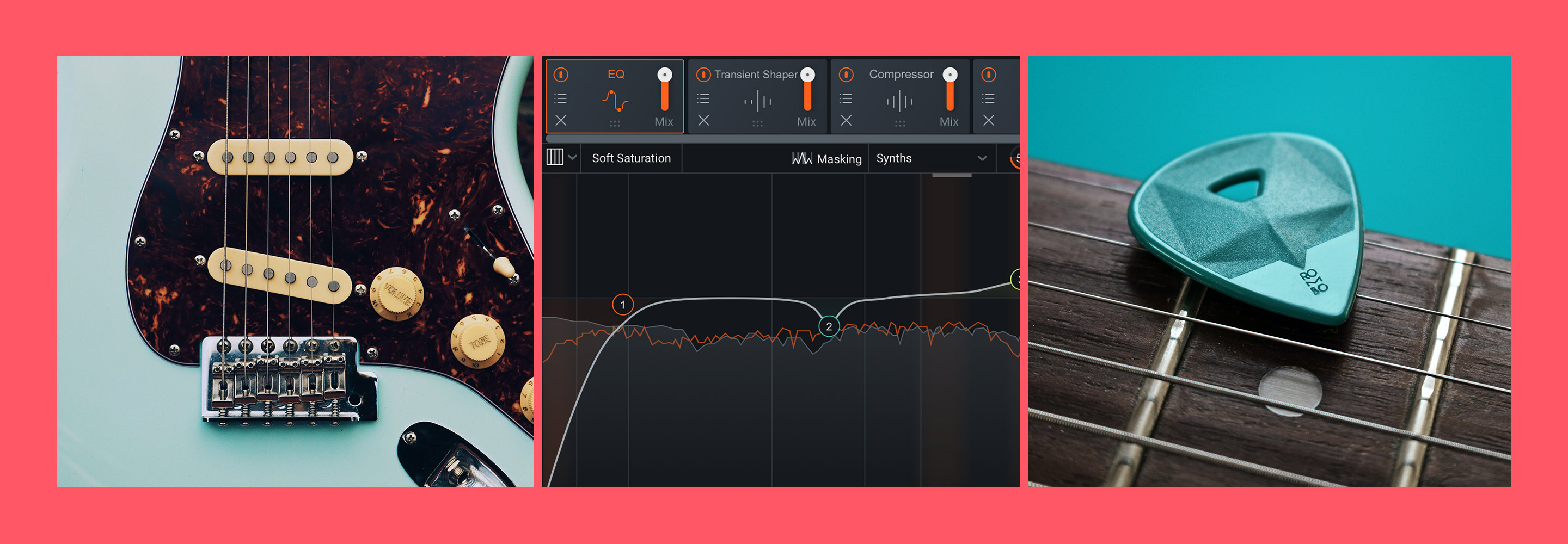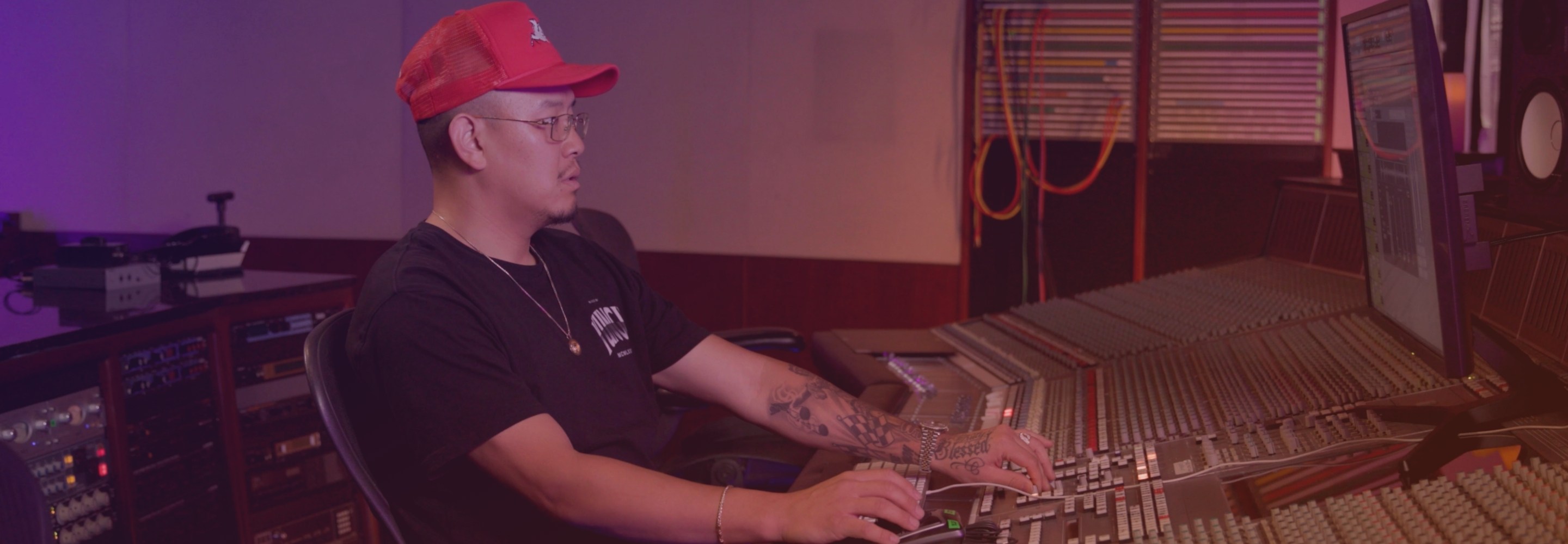
Artist Interview: Elijah Woods x Jamie Fine
Canadian electronic duo Elijah Woods x Jamie Fine talk about the advantages of home recording, their songwriting process, and...culinary school?
These days, bands don’t need to book expensive studio time to bring great sounding music into the world, and musicians can meet pretty much anywhere. This is case for Elijah Woods x Jamie Fine, a Canadian electronic-pop duo that’s recording their first songs from the comfort of Elijah’s home studio in Perth, Ontario.
With two singles released, “Wouldn’t Be Enough” and “Stone Heart,” I recently spoke with Elijah and Jamie by phone about home recording, their songwriting process, and how the two came to make music together.
Where did you guys meet? Tell me the Elijah Woods x Jamie Fine origin story!
Elijah: I was taking an engineering/production program at Algonquin College in Ottawa. A friend of mine had done a project with Jamie, and her vocals were featured on the song. I heard her vocals through an iPhone speaker and kind of freaked out.
This was about three years ago now. She actually was working at the college at the time in a culinary program. I invited her into the studio, and she wrote some material for me, and I kind of fell in love. I couldn’t hear past her voice anymore—everyone else I heard was sort of underwhelming. From there, we’ve kept writing together.
Jamie: I’m a little flustered. You’ve flustered me! [laughs]. When I first met Elijah, it was very much the same thing on my end. His instrumental production was outrageously talented. I had worked with a few other producers beforehand, and there was just no comparison with pure skill and vision. He had incredible vision as to where to take everything we did, and that was a quality I had yet to experience with a producer. He takes the music I want to do to the next level, and hopefully the same is true on Elijah’s end.
Did you say culinary school?
Jamie: Yeah! I was in culinary school for two years at the same college. Even though I wanted to do music, culinary school seemed like the more practical way to go. I graduated and was working at the college when Elijah was in his program. We met when I was working there and he was in school.
“We all had this thing where our parents wanted us to go to school for something, and we were like ‘Oh, alright. Culinary it is.’” - Jamie Fine
Are you a chef now? Are you practicing the culinary arts?
Jamie: I own two companies, including a catering company. I graduated from culinary school and had restauraunt opportunities but really just wanted to learn on my own—and also work on music as much as I could. It was really important for me to create something where I could pay the bills, work on my craft, and simultaneously work on music, which is my real passion. I started opening the businesses and working on music simultaneously.
Are your music and culinary worlds separate? Do they ever collide?
Jamie: You’d be shocked at the similarities between the two. It was hilarious to see how many musicians were at the culinary program. There were a lot of talented musicians—not as many vocalists—but many guitar players, bass players, and percussionists who decided to go to culinary. We all had this thing where our parents wanted us to go to school for something, and we were like “Oh, alright. Culinary it is.”
They’re both very creative industries, and they both compliment each other well. The tagline for second company I opened is that we want to evoke the same emotion that you’d feel listening to a beautiful piano melody as you would tasting flavors you’ve never tasted before.
Elijah: I can definitely attest to the fact that Jamie is a talented cook.
I want to talk about your songwriting process. You have two singles out so far, “Wouldn’t Be Enough” and “Stone Heart.”
Elijah: Yup, “Wouldn’t Be Enough” was late January 2017 and “Stone Heart” was early March. “Wouldn’t Be Enough” was more of a radio and commercial push, and “Stone Heart” was more of an online buzz track to keep the ball rolling and develop fans—appealing to a larger, mainstream demographic.
We’re in the process of releasing a five-song project with visuals, and in turn releasing a ten-song project. Those will all be singles. These first two are part of that project, and the third song is coming out mid-April or early May.
In terms of the songwriting process, it sort of varies. I handle all the production and Jamie handles the vocal writing, but that’s become intertwined in the last year. But we don’t just write for ourselves, we write downloads for other artists. That’s where we started. We determined that we were going to be artists about a year ago, and we decided to go all in. That was our manager saying, “You’ve got some great material; you should try and make a go of it by yourselves.” It’s been a really interesting transition since Jamie and I are both writers through and through.
But the process depends on the song. Sometimes I’ll write an instrumental or piano piece and send it to Jamie, and she’ll come back at me with some top line ideas and we’ll develop it from there. Sometimes I have a full production and Jamie will write a vocal line. Sometimes we get together, and I’ll play a few chords and write a top line together start to finish, and then I’ll handle the production on my own. Jamie is developing her skill in production, but we complement each other in our skills in a way that I’ve never worked with anyone before. It’s like this multiplication effect, which sounds super cheesy, but it’s why we chose the branding we did: Elijah Woods x Jamie Fine. The writing we do is exponential together, as opposed to two people just writing a song.
Where do you record?
Elijah: I have a studio in Perth that I built. Perth is this small city—well, I wouldn’t call it a city. It’s a town that’s outside of Ottawa, which is the capital of Canada, obviously. It’s about forty-five minutes to an hour outside of Ottawa, and I built the studio literally in the middle of nowhere because that’s the town where I’m from. Jamie will come out and we’ll record there. I built the studio in my basement, and we have all the gear there. I run an Apollo Rig, and we have a Neumann U 87 mic, so we have good gear and a good space to record it. So everything you hear on the record is all done in the box or recorded in that room.
“Reverbs kind of freak me out in Nectar because they’re scary close to what they should be.” - Elijah Woods

Elijah Woods’ home studio
Do you run into any home recording challenges? Is there anything you’d like to have that you don’t yet?
Elijah: Obviously I’d love an SSL desk or something, but that’s just about affording stuff [laughs]. But something I would like is a live room. I don’t do too much live stuff, and all the live stuff I do I tend to go into a studio and record kick drum samples and use them later. So I guess there’s nothing I really need in terms of live recording. Maybe a larger array of microphones, but right now we have a few really great ones.
Jamie: As someone who doesn’t own that kind of stuff, I actually think it’s the opposite: we run into fewer issues because of the comfort having our own studio brings. It’s nice to have a studio in a small town and comfortable space. It helps with the writing. Sometimes it can be super overwhelming being in a big, commercial studio. It’s so important to have the right atmosphere to be able to perform to the best of your ability, especially for vocalists. I never run into problems like that at Elijah’s place because it’s so peaceful and calm.
On Facebook you write: “The duo has meant to breach the boundaries of every genre out there—with hints that there’ll be dancehall, hip-hop, jazz influences that consistently shake up the tune.” How intentionally do you try to span multiple genres?
Jamie: It’s not so much intentional as it is organic. Both Elijah and I have backgrounds of different styles of music—whether it’s from our parents, uncles, aunts, cousins—the list goes on. When we sit down to write music together, we pull from so many different styles to create sounds. It helps break down the barrier for artists who think they have to stick to one genre of music. That defeats the purpose, right? There are so many beautiful aspects of every genre, so why not pull from them to make one body of work?
Elijah: If we write a dancehall track, that’s what we were feeling in the moment. If it’s 2:00 a.m. and we’re kind of drunk, maybe we’ll write a dancehall track. If I’m feeling kind of sad, we’ll write a jazzy, dark piece. That’s where we end up a lot—dark music. There’s a Weeknd quote I like a lot from Starboy: “It’s good to have darkness, because when the light comes, it’s that much better.” I feel that about our music, too. We pull on those emotional aspects and have dark pieces in our music, but when that bright side comes through it’s also when our musical diversity comes through.
On more of a superficial, marketing level, it’s hard to keep people’s attention these days—especially trying to develop a sound as an artist. Everyone’s skipping songs left and right, so you’re trying to keep songs and projects as interesting as possible by accomplishing as many genres as possible. In doing that, it keeps the listener engaged. We want to keep things organic and approachable.
Jamie, this is a question for you: if there was a food that could describe your music, what would it be?
Jamie: Pizza, because even when it’s bad it’s good [laughs]. We like to think you can’t go wrong with an EWxJF track.
Feel free to use that marketing.
Elijah: That’ll be the album name: Pizza.
Your song artwork and video production quality are top-notch. Visuals are obviously important to your brand. How would you describe your visual brand?
Elijah: When we’re writing, we’re approaching a lot of different genres of music, and we try to evoke emotion. That’s our big thing in branding: we want people to feel what the music is supposed to convey. We don’t want music you can throw on in the background and not really think about it, and we want our visuals to be the same way. So when you watch the visuals, they’re sort of cinematic. You’re involved in whatever that storyline is. We intentionally branched away from having the artist in the video; for example, rapping on screen with a bunch of girls and cars. We want the visuals to almost feel like short films, and I think we accomplished that in our upcoming (third) release. But the first two songs were shot by a videographer named Shamlo Faek, an insanely talented, nineteen-year-old kid from Vancouver. He’s wild, has crazy vision, and is really unorthodox, which we love. When we first reached out to him, he was very interested in the project. He flew out and we filmed “Wouldn’t Be Enough.” That video has more of a storyline, while “Stone Heart” is more abstract. The music’s sort of slow and draggy, behind the beat, but the music is super intense, which we really like.
As for the artwork, as simple as it sounds, we hired a graphic designer who did the visuals, and I just thought they were beautiful. It’s all about incorporating the emotional spectrum into the branding. We want it to be very relatable and not synthetic and overdone.
Jamie: Both Elijah and I understand that there are some people that are not as emotional as others, and so we are targeting everybody with our music. As for the visuals, they’re really for the people who are more emotional—the people who listen to a song, picture something, and look at the visual and say, “That’s exactly what I pictured.” Not in terms of what’s going on in the song, but how it makes them feel or enhances how they feel. Then there are going to be the people who watch our videos and just say, “That’s sick,” which is fine too.
We’re targeting everyone with our music, but we have an appreciation for those who are a bit more emotional. I’m one of the most emotional people you’ll ever meet.
Elijah: I can vouch for that.
Jamie: Thanks, Elijah.
What iZotope products do you use, and how do you use them?
Elijah: I use pretty much everything. I really like Neutron. Really, really cool stuff. I love how clean and transparent all the products are. If I’m mastering someone else’s track, I use Ozone. I’ve used Trash’s distortion. I also use iZotope Insight a fair bit when I’m mixing.
I love Nectar on vocals—I use a lot of UAD on my vocals, but I find Nectar sometimes replaces the UAD. I use Nectar instead and still get that same shine and shimmer. Reverbs kind of freak me out in Nectar because they’re scary close to what they should be.
Ozone's vintage stuff is really cool. I use a lot of that for saturation, and I use that for mixtape stuff, too. I’ll use the vintage tape machine on individual tracks—I like it if I’m doing a stem mix or something.
What’s next for Elijah Woods x Jamie Fine?
Jamie: Just continuing to do what we love to do and exploring new things. We think this is the beginning of something cool that we’re both really proud of—especially being from Canada. Unfortunately, there are barriers to being a Canadian artist, and we want to break those. We want to create a sound that can’t be described as Canadian, American, or from the UK, or something like that. We just want to do something different, and that’s super important to us. We think we’re well on the way to doing that. It will be a year to remember, and hopefully many more to come.


